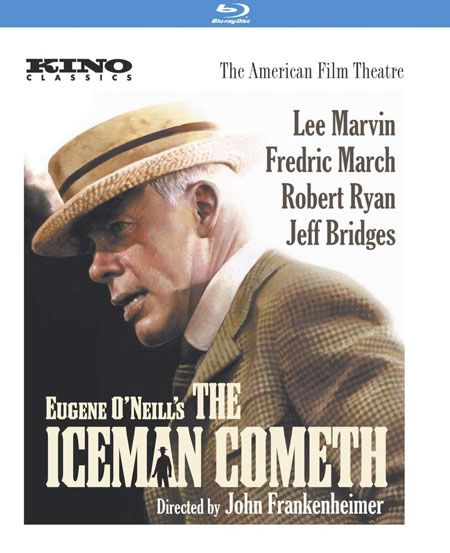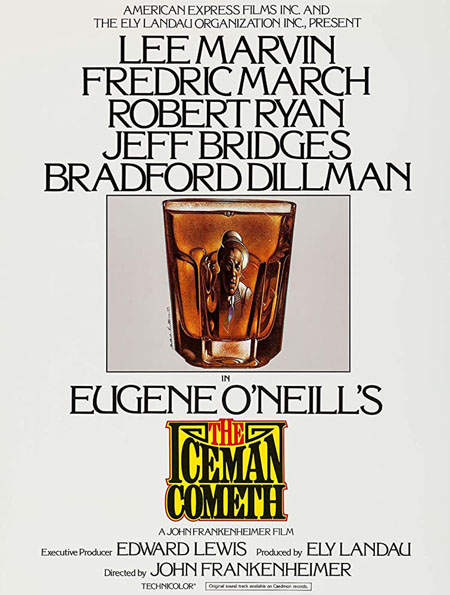
“PIPE
DREAMSâ€
By
Raymond Benson
Back
in 1973, producer Ely Landau and his wife Edie launched a daring and
unprecedented cinema series that played in the U.S. for two “seasons,†with a
total of fourteen titles (but only thirteen were shown), all renowned
works—classic and modern—originally produced on the stage. It was called the
American Film Theatre. (A review of a DVD box set of the entire series appeared
on Cinema Retro previously. Click here to read.)
The
concept tried something different. The directive was to take a great stage
play, not change a word, and in
most cases, use the actual play script as the screenplay. The next step was to
hire an accomplished film director to interpret the text for the film medium but stay faithful to the play.
Sometimes the director was the same person who helmed the original stage
production. A further step was to persuade the original casts from the Broadway
or London productions of those plays to star in the film; or, when that wasn’t
possible, to cast big-name Hollywood or British actors. Thus, the result was
indeed a filmed play—but you as an audience member wouldn’t be watching it from
the middle of the orchestra or from the side or from the first balcony; instead
you were up close and personal in a realistically-presented world (on studio
sets and/or real interior or exterior locations)—just like in “regular†movies.
You had the best seat in the house, so to speak, but there’s no proscenium
arch. It’s a movie. But it’s a play.
Kino
Lorber has slowly been re-releasing the movies from the American Film Theatre
in individual packages, upgraded to high definition Blu-ray. One recent title
is the picture that opened the series, and it’s one of the best. The Iceman
Cometh, from the play by Eugene O’Neill, is directed by the formidable John
Frankenheimer (the script was adapted by Thomas Quinn Curtiss), and is a
remarkably faithful rendition of this lengthy powerhouse of a stage drama.
While the filmmakers indeed made some cuts to the text, the picture still runs
just a minute or two less than four hours, and that’s not including two
built-in intermissions! (Have you ever seen a film in a theater with two intermissions?
It’s not unusual for the theatre, though!)
This
is drama with a capital “D.†You get to spend the four hours with a bunch of
hopeless alcoholics in a dark, decrepit Irish bar in the big city and listen to
their tales of woe and “pipe dreamsâ€â€”the theme running through the piece that
highlights the hopes and wasted lives of men and women on the fringe. The play
originally premiered in the mid-1940s, about a decade after AA became a thing. Doesn’t
sound like a lot of fun? Stop! It’s true that the tale is terribly depressing,
but Iceman is such a masterwork in writing and acting that you come out
enlightened and, yes, changed.
An
amazing cast dominates the production. Lee Marvin stars in the showy role of
Hickey, a traveling salesman who has gone on the wagon and is usually the life
of the party when he comes into town—but now he’s preaching abstinence to the
motley crew who doesn’t want to hear it. Fredric March, in his last screen
appearance, plays Harry Hope, the owner of the bar, but he’s just as damaged and
forlorn as the rest of his clientele. Robert Ryan (who co-starred with Marvin in the classics Bad Day at Black Rock and The Professionals), also in his last film role, steals
the movie in an amazing performance as Larry Slade, a bitter anarchist and
journalist who is really the protagonist of the story and through whose eyes we
navigate this precarious jungle of fog and booze. A very young Jeff Bridges,
only a couple of years after his big splash in The Last Picture Show,
plays Don Parritt, the son of Larry’s girlfriend—a woman who has been arrested
for her political activities.
Those
are the main four genius thespians on display here, but a supporting cast
consists of the likes of Bradford Dillman, Moses Gunn, Sorrell Brooke, Clifton
James, Tom Pedi, and Martyn Green, plus the three streetwalking ladies who
congregate and cavort with the men, played by Evans Evans, Hildy Brooks, and
Nancy Juno Dawson.

Ralph
Woolsey’s cinematography is dark and dingy, perfectly fitting the play, but in Kino
Classics’ 2K high definition restoration exhibits much graininess—which is
fine, considering the theme of the tale. The 2-disk package contains two
versions of the film. Disk One is the original 239-minute cut that was featured
in the American Film Theatre presentations. Disk Two contains a 178-minute cut
that was released theatrically in 1975 when Ely Landau decided to showcase a
few of the AFT titles and release them in regular runs (such as The Man in
the Glass Booth). Cutting an hour off the running time did not do The
Iceman Cometh any favors. Stick with the original.
Disk
Two also features an interview with co-producer Edie Landau, and a short promo
piece on the AFT with Ely (these pieces appear on every Kino Blu-ray re-issue
of each title in the series). There are also trailers for the other AFT
releases.
The
Iceman Cometh is
one of the handful of five-star entries in this unique experiment that was the
American Film Theatre. Take an afternoon or an evening, pour a glass of Scotch,
and sit back to savor this excellent example of actors—and a superb
playwright—at work.
CLICK HERE TO ORDER FROM AMAZON